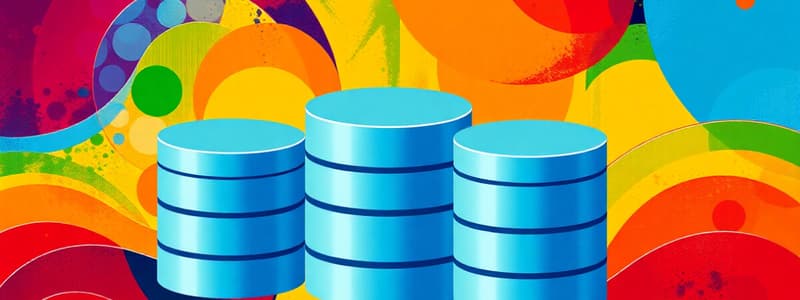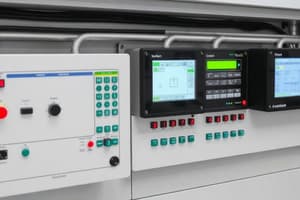Podcast
Questions and Answers
What are the two types of databases used in Experion?
What are the two types of databases used in Experion?
- Microsoft Databases
- Honeywell Databases (correct)
- Standard Windows Databases (correct)
- Open-source Databases
Where does the Active Directory database reside?
Where does the Active Directory database reside?
On a Domain Controller
What type of information does the Security Account Manager (SAM) contain?
What type of information does the Security Account Manager (SAM) contain?
Local Users and Groups
Which of the following databases is an SQL database residing on Experion Servers?
Which of the following databases is an SQL database residing on Experion Servers?
The ______ Database contains Controller related information.
The ______ Database contains Controller related information.
There is more than one Enterprise Model Database (EMDB) in an Experion System.
There is more than one Enterprise Model Database (EMDB) in an Experion System.
What does the Quick Builder Database (QDB) consist of?
What does the Quick Builder Database (QDB) consist of?
Which type of information is stored in the Active Directory?
Which type of information is stored in the Active Directory?
What is the purpose of the System Repository (SR)?
What is the purpose of the System Repository (SR)?
The Dynamic Alarm Suppression Database (DASDB) stores alarm suppression information.
The Dynamic Alarm Suppression Database (DASDB) stores alarm suppression information.
Which database is unique to the Experion system and can only be found once in the entire system?
Which database is unique to the Experion system and can only be found once in the entire system?
What type of information does the ERDB primarily contain?
What type of information does the ERDB primarily contain?
In which location is the IDB typically stored?
In which location is the IDB typically stored?
How does the RTDB on the primary Experion Server interact with Console Stations?
How does the RTDB on the primary Experion Server interact with Console Stations?
What is a distinguishing feature of the RTDB in relation to redundant pairs?
What is a distinguishing feature of the RTDB in relation to redundant pairs?
Which Experion Server database contains information about SCADA points and controllers?
Which Experion Server database contains information about SCADA points and controllers?
What type of database is present on every Experion Server, including those in clusters?
What type of database is present on every Experion Server, including those in clusters?
Which statement is true about the Security Account Manager (SAM)?
Which statement is true about the Security Account Manager (SAM)?
Which of the following databases specifically contains dynamic alarm suppression information?
Which of the following databases specifically contains dynamic alarm suppression information?
How many ERDBs are there on each Experion Server?
How many ERDBs are there on each Experion Server?
Which database contains alarm suppression information?
Which database contains alarm suppression information?
Which database is specifically located on nodes with the Experion Support and Maintenance (ESM) Server installed?
Which database is specifically located on nodes with the Experion Support and Maintenance (ESM) Server installed?
What type of database is the Enterprise Model Database (EMDB)?
What type of database is the Enterprise Model Database (EMDB)?
Where is the Real Time Database (RTDB) located?
Where is the Real Time Database (RTDB) located?
Which of the following is NOT typically managed within Active Directory?
Which of the following is NOT typically managed within Active Directory?
How does Active Directory replicate information?
How does Active Directory replicate information?
What is the main function of the Engineering Repository Database (ERDB)?
What is the main function of the Engineering Repository Database (ERDB)?
Which database is responsible for SCADA related information?
Which database is responsible for SCADA related information?
In what scenario would you find different Local Users and Groups in SAM across nodes?
In what scenario would you find different Local Users and Groups in SAM across nodes?
How many EMDBs can exist in a system with multiple Experion Server pairs?
How many EMDBs can exist in a system with multiple Experion Server pairs?
What is the primary function of the Enterprise Model Database (EMDB) within the Experion System?
What is the primary function of the Enterprise Model Database (EMDB) within the Experion System?
How is the EMDB affected if redundant servers A and B are present in the system?
How is the EMDB affected if redundant servers A and B are present in the system?
What structure does the Asset Model typically utilize within the Experion System?
What structure does the Asset Model typically utilize within the Experion System?
What function does the Alarm Group Model serve within the EMDB?
What function does the Alarm Group Model serve within the EMDB?
What does the System Model in the EMDB represent?
What does the System Model in the EMDB represent?
In a Distributed System Architecture (DSA), what facilitates communication between servers?
In a Distributed System Architecture (DSA), what facilitates communication between servers?
What type of information does the System Definition and Configuration include?
What type of information does the System Definition and Configuration include?
Which of the following correctly describes the function of the servers classified as 'External to the system' within the EMDB?
Which of the following correctly describes the function of the servers classified as 'External to the system' within the EMDB?
What is the main purpose of defining assets in the Asset Model?
What is the main purpose of defining assets in the Asset Model?
Which aspect of an Experion System is managed by the EMDB?
Which aspect of an Experion System is managed by the EMDB?
What must occur for changes made to the EMDB to be effective?
What must occur for changes made to the EMDB to be effective?
Which statement about the Engineering Repository Database (ERDB) is true?
Which statement about the Engineering Repository Database (ERDB) is true?
How does the System Repository (SR) acquire data?
How does the System Repository (SR) acquire data?
What is the role of file replication in the context of the Quick Builder Database (QDB)?
What is the role of file replication in the context of the Quick Builder Database (QDB)?
In an Experion system, where does the EMDB reside?
In an Experion system, where does the EMDB reside?
What types of controllers are supported by the Engineering Repository Database (ERDB)?
What types of controllers are supported by the Engineering Repository Database (ERDB)?
What does the QDB database consist of?
What does the QDB database consist of?
Which of the following describes the purpose of the changes made through Configuration Studio?
Which of the following describes the purpose of the changes made through Configuration Studio?
What is one characteristic of the ERDB in relation to the servers?
What is one characteristic of the ERDB in relation to the servers?
What type of data does the System Repository (SR) resolve?
What type of data does the System Repository (SR) resolve?
Which database type is responsible for managing users and groups at a domain level?
Which database type is responsible for managing users and groups at a domain level?
What is unique about the Security Account Manager (SAM) in comparison to other databases?
What is unique about the Security Account Manager (SAM) in comparison to other databases?
Which of the following databases is specifically designed to handle alarm suppression information?
Which of the following databases is specifically designed to handle alarm suppression information?
In an Experion system, which of the following statements is true regarding the Enterprise Model Database (EMDB)?
In an Experion system, which of the following statements is true regarding the Enterprise Model Database (EMDB)?
Which of the following databases stores SCADA related information?
Which of the following databases stores SCADA related information?
Which database is specifically responsible for storing configuration information for various controllers such as C200, C200E, C300, UOC, and vUOC?
Which database is specifically responsible for storing configuration information for various controllers such as C200, C200E, C300, UOC, and vUOC?
What type of data can typically be found in the Real-Time Database (RTDB) of an Experion Server?
What type of data can typically be found in the Real-Time Database (RTDB) of an Experion Server?
Which of the following statements about the Experion Support and Maintenance (ESM) Server is true?
Which of the following statements about the Experion Support and Maintenance (ESM) Server is true?
In terms of redundancy, how is the RTDB treated in redundant Experion Server pairs?
In terms of redundancy, how is the RTDB treated in redundant Experion Server pairs?
How many types of databases are present on each Experion Server?
How many types of databases are present on each Experion Server?
Which of the following databases is replicated to Console Stations within its cluster?
Which of the following databases is replicated to Console Stations within its cluster?
What distinguishes the Security Account Manager (SAM) from Active Directory?
What distinguishes the Security Account Manager (SAM) from Active Directory?
Which database contains information specifically related to alarm suppression?
Which database contains information specifically related to alarm suppression?
How are changes made in Active Directory handled across domain controllers?
How are changes made in Active Directory handled across domain controllers?
What type of information does the Engineering Repository Database (ERDB) primarily include?
What type of information does the Engineering Repository Database (ERDB) primarily include?
What aspect does the Asset Model in the Experion System primarily define?
What aspect does the Asset Model in the Experion System primarily define?
Which statement correctly describes the System Model in the EMDB?
Which statement correctly describes the System Model in the EMDB?
Which option accurately describes the role of Distributed System Architecture (DSA)?
Which option accurately describes the role of Distributed System Architecture (DSA)?
What is the primary purpose of the Alarm Group Model within the EMDB?
What is the primary purpose of the Alarm Group Model within the EMDB?
In a system with redundant servers A and B, where does the master copy of the EMDB reside?
In a system with redundant servers A and B, where does the master copy of the EMDB reside?
What key functionality does the System Definition and Configuration provide?
What key functionality does the System Definition and Configuration provide?
How is the EMDB utilized during software installation in an Experion System?
How is the EMDB utilized during software installation in an Experion System?
Which database specifically stores alarm suppression information on every Experion Server?
Which database specifically stores alarm suppression information on every Experion Server?
What is the role of the Real-Time Database (RTDB) in an Experion Server?
What is the role of the Real-Time Database (RTDB) in an Experion Server?
Which database provides configuration information for multiple types of controllers including C200 and C300?
Which database provides configuration information for multiple types of controllers including C200 and C300?
Which statement best describes the presence of EMDB in the Experion System?
Which statement best describes the presence of EMDB in the Experion System?
How are changes made to the RTDB from Console Stations handled?
How are changes made to the RTDB from Console Stations handled?
On which type of nodes is the IDB typically found in the Experion System?
On which type of nodes is the IDB typically found in the Experion System?
What distinguishes the RTDB on redundant pairs of Experion Servers?
What distinguishes the RTDB on redundant pairs of Experion Servers?
What key information does the QDB primarily contain?
What key information does the QDB primarily contain?
Flashcards are hidden until you start studying
Study Notes
Database Types
- Experion uses two types of databases:
- Standard Windows Databases
- Honeywell Databases
Windows Databases
-
Active Directory:
- Resides on a Domain Controller.
- Contains information regarding:
- Users and Groups
- Group policy objects
- Computers
- Subnets
- Sites
- DNS Zones
- Information is replicated across all domain controllers in the domain.
-
Security Account Manager (SAM):
- Resides on all non-domain controller machines, including servers and stations.
- Contains Local Users and Groups.
- Each machine has a unique SAM database with different security identifiers (SIDs).
- SAM accounts typically have the same names and passwords in different nodes, providing "workgroup type" security.
### Honeywell Databases
-
Real-Time Database (RTDB):
- Resides on Experion Servers.
- Each Experion Server has its own RTDB that's replicated to the Console Stations in its cluster.
- Contains Experion configuration items, including users, groups, stations, assets, controllers, and points.
- Changes made to the RTDB from a Console Station are applied to the primary Experion Server and replicated to the Console Station’s RTDB.
- Accessible through Station and Configuration Studio.
-
Enterprise Model Database (EMDB):
- SQL database that resides on a single Experion Server pair within the system.
- Contains server information, assets, alarm groups, and network equipment.
- Master copy resides on one server within a redundant pair.
- Downloaded to the RTDBs of all servers in the system.
- Used through Configuration Studio.
-
Engineering Repository Database (ERDB):
- SQL database that resides on Experion Servers.
- Contains controller-related information, including configuration for C200, C200E, C300, UOC, and vUOC controllers.
- Master copy resides on one server within a redundant pair.
- Downloaded to the RTDBs of the servers and directly to the controllers.
-
Quick Builder Database (QDB):
- SQL database that resides on Experion Servers.
- Contains information related to Quick Builder, including channels, controllers, points, stations, printers, equipment, and EFM meters.
- Downloaded to the RTDB of the local Experion Server.
-
Installation Database (IDB):
- Resides on the Experion Support and Maintenance (ESM) Server.
- Contains node configuration information.
- May reside on an Experion Server, an Experion Application Server, or a non-Experion node.
-
Dynamic Alarm Suppression Database (DAS DB):
- SQL database that resides on Experion Servers.
- Contains alarm suppression information.
- Accessed through an XML file.
### System Model
- Represents the limits of an Experion System.
- Defined by specifying the servers that are part of the system.
- Includes servers that are "external to the system" for DSA communication.
### Asset Model
- Defines all assets within the system.
- Assets are assigned to operators and stations to determine their Scope of Responsibility.
- Assets are hierarchical and similar to “units" in TPS.
### Alarm Group Model
- Groups unrelated points for alarming purposes.
### System Definition and Configuration
- Includes specifying the networking information of:
- Nodes
- Switches
- Control firewalls
### Single Experion System: One EMDB
- Recommends one EMDB per system for all servers.
- Distributed System Architecture (DSA) allows servers to share data, alarms, messages, and history with each other.
### EMDB Entries Downloaded to RTDB
- Changes to the EMDB are synced to the RTDBs of all servers through Configuration Studio.
- EMDB is offline, so changes must be downloaded to the online RTDB to be effective.
### System Repository (SR)
- Allows the CDA service to resolve tag parameters by clients to handles.
- SDA service uses handles to request data from controllers.
- Experion uses a push model; runtime information is sent from the ERDB and Safety Manager database to the SR.
### Quick Builder Database Replication
- Backup and restore functionality exists for Quick Builder database redundancy.
- File Replication is used to transfer backup files from the primary server to the secondary server.
Database Types
- Two types of databases are used in Experion: standard Windows and Honeywell
- Windows Databases:
- Active Directory: located on Domain Controllers
- Security Account Manager (SAM): located on all non-domain controller machines, including servers and stations
- Honeywell Databases:
- Real Time Database (RTDB): Located on Experion Servers, replicated to Console Stations in the same cluster
- Enterprise Model Database (EMDB): SQL database located on one Experion Server pair within the system
- Engineering Repository Database (ERDB): SQL database located on Experion Servers, contains controller-related information
- Quick Builder Database (QDB): SQL database located on Experion Servers, contains SCADA-related information
- Dynamic Alarm Suppression Database (DAS DB): SQL database located on Experion Servers, contains alarm suppression information
Active Directory Information
- Active Directory is a Windows database that contains information on:
- Users and Groups: centrally managed by a System Administrator
- Group Policy Objects
- Computers
- Subnets and various Sites
- DNS Zones
- All domain controllers in the domain share the same Active Directory information, changes are replicated.
Security Account Manager (SAM)
- SAM is a standard Windows database located on each machine that is not a domain controller.
- Contains Local Users and Groups.
- Different on every node, Windows assigns a different security identifier (SID) to each user.
- Provides 'workgroup type' security.
Honeywell Databases
- Real-Time Database (RTDB):
- Each Experion Server contains its own RTDB.
- The RTDB is replicated to all Console Stations in the server's cluster.
- Changes made to the RTDB are replicated to the primary Experion Server and then to the Console Stations.
- Can be accessed through Station and Configuration Studio.
- Enterprise Model Database (EMDB):
- Located on only one Experion Server pair in the entire system.
- Contains information about:
- Servers (System Model)
- Assets
- Alarm Groups
- Networking Equipment
- Downloaded to the RTDB of all servers in the system.
- Can be accessed by Configuration Studio, and changes must be downloaded to the RTDB to be effective.
- Engineering Repository Database (ERDB):
- Contains control strategies for various controllers (C200, C200E, C300, UOC, vUOC).
- Portions of the ERDB are downloaded to the server's RTDB, and other portions are downloaded directly to the controller.
- Quick Builder Database (QDB):
- Contains information about:
- Channels
- Controllers
- Points
- Stations
- Printers
- Equipment
- EFM Meters
- Downloaded to the local Experion Server's RTDB.
- Contains information about:
- System Repository (SR):
- Allows the CDA service to resolve tag.parameters to handles.
- Handles are used to request data from controllers.
- Runtime information is pushed from ERDB and Safety Manager database to the SR.
- Dynamic Alarm Suppression Database (DASDB):
- Contains alarm suppression information.
- Located on each Experion Server.
System Model
- Represents the limits of a system.
- Defined by specifying the servers that are part of the system.
- Allows DSA communication between all servers defined in the EMDB, regardless of system.
Asset Model
- Defines all assets within the system.
- Assets are assigned to operators and stations to determine their scope of responsibility.
- Similar to 'unit' in TPS.
- Typically structured in a hierarchical tree.
Alarm Group Model
- Allows grouping of unrelated points for alarming purposes.
System Definition and Configuration
- Typically includes specifying networking information of nodes, switches, control firewalls, etc.
DSA Architecture
- Distributed System Architecture (DSA) allows servers to share data, alarms, messages, and history.
- Changes to the EMDB are replicated to the RTDBs of all servers.
Backup & Redundancy
- The SQL server has a backup and restore functionality for Quick Builder database redundancy.
- File Replication is used to transfer backup files from the primary server to the backup.
Database Types
- Experion uses two types of databases: standard Windows and Honeywell.
Standard Windows Databases
- Active Directory resides on a Domain Controller.
- It centrally manages users, groups, computers, subnets, sites, and DNS zones.
- Changes to Active Directory are replicated to all domain controllers.
- Security Account Manager (SAM) resides on all non-domain controller machines.
- It contains local users and groups.
- Each machine has a unique SAM database.
Honeywell Databases
- Real Time Database (RTDB) resides on each Experion Server.
- RTDBs are replicated to Console Stations in the same cluster.
- Contains crucial information such as users, groups, stations, assets, channels, controllers, and points.
- Enterprise Model Database (EMDB) is an SQL database residing on one Experion Server pair.
- Manages the system model, assets, alarm groups, and networking equipment.
- EMDB contents are downloaded to the RTDB of all servers.
- Engineering Repository Database (ERDB) is an SQL database residing on Experion Servers.
- Contains configuration information for C200, C200E, C300, UOC, and vUOC controllers.
- Portions of the ERDB are downloaded to the RTDB and controllers.
- Quick Builder Database (QDB) is an SQL database residing on Experion Servers.
- Contains configuration for SCADA points and controllers, built using Quick Builder.
- Data is downloaded to the RTDB of the local Experion Server.
- Dynamic Alarm Suppression Database (DAS DB) is an SQL database residing on Experion Servers.
- Contains alarm suppression information.
System Model
- Defines boundaries of an Experion system by listing participating servers.
- Allows communication between servers, even if they are in different systems.
Asset Model
- Defines all assets within the system, assigning them to operators and stations.
- Determines the scope of responsibility for operators.
Alarm Group Model
- Allows grouping of points that are not related for alarming purposes.
Single Experion System
- A single EMDB resides on one server within the system.
- Distributed System Architecture (DSA) enables data sharing between servers.
ERDB
- Contains control strategies for C200/C200E, C300, UOC/vUOC, and ACE controllers.
- Portions are downloaded to RTDB and controllers.
System Repository (SR)
- Used by the CDA service to resolve tag parameters and request data from controllers.
- Employs a push model, receiving runtime information from ERDB and Safety Manager database.
Quick Builder Database (QDB)
- Contains information created with Quick Builder: channels, controllers, points, stations, printers, equipment, and flow meters.
- Uses file replication for backup redundancy.
Database Types
- Two types of databases are used in Experion: Standard Windows Databases and Honeywell Databases
Windows Databases
- Active Directory resides on a Domain Controller, manages information such as:
- Users and Groups
- Group Policy Objects
- Computers
- Subnets and Sites
- DNS Zones
- Security Account Manager (SAM) resides on non-domain controller machines, and contains:
- Local Users and Groups
Honeywell Databases
- Real-Time Database (RTDB)
- Resides on Experion servers.
- Each Experion Server in a cluster has an independent RTDB that is replicated to Console Stations.
- Contains configuration items related to:
- Users and Groups
- Stations (Flex and Conso)
- Assets
- Channels, Controllers, and Points
- Enterprise Model Database (EMDB)
- An SQL database that resides on a single Experion Server pair within a system.
- Contains information about:
- Servers (System Model)
- Assets
- Alarm Groups
- Networking Equipment
- The EMDB is downloaded to the RTDB of all Experion Servers in the system.
- Engineering Repository Database (ERDB)
- An SQL database residing on Experion Servers, containing information about:
- C200, C200E, C300, UOC, and vUOC controllers
- Portions of the ERDB are downloaded to the RTDB of the server and to the controllers.
- An SQL database residing on Experion Servers, containing information about:
- Quick Builder Database (QDB)
- An SQL database residing on Experion servers.
- Stores information built using Quick Builder, including:
- Channels
- Controllers
- Points
- Stations
- Printers
- Equipment
- EFM meters
- The QDB is downloaded to the RTDB of the local Experion Server.
- Dynamic Alarm Suppression Database (DAS DB)
- An SQL database residing on an Experion Server, containing alarm suppression information.
System Model
- Represents the limits of an Experion system defined by the servers included in that system.
- Allows for communication between servers within and outside the system through Distributed System Architecture (DSA).
Asset Model
- Defines assets within the system and assigns them to operators and stations, determining their Scope of Responsibility.
- Typically structured in a hierarchical tree.
Alarm Group Model
- Allows grouping of unrelated points for alarming purposes.
Single Experion System Architecture
- A recommended architecture uses clusters of servers in one system, with a single EMDB.
- The EMDB is present on one server in the system.
- DSA enables servers to share data, alarms, messages, and history.
- Changes to the EMDB are automatically replicated to all servers.
Studying That Suits You
Use AI to generate personalized quizzes and flashcards to suit your learning preferences.




